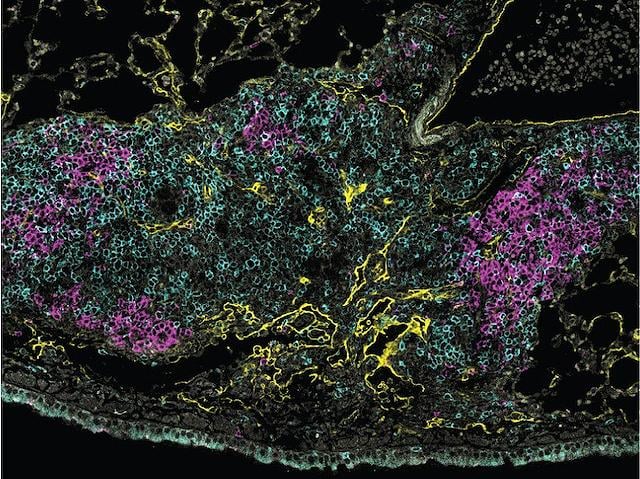Recent News
November 2024
 Anukriti Mathur, PhD, was recently awarded the Cancer Research Institute Irvington Postdoctoral Fellowship, an award that supports young scientists who are pursuing training in fundamental or cancer immunology. With the award, Dr. Mathur aims to explore the role of inflammasome pathways in skin immunity and melanoma. Read the full story in the Department of Medicine news.
Anukriti Mathur, PhD, was recently awarded the Cancer Research Institute Irvington Postdoctoral Fellowship, an award that supports young scientists who are pursuing training in fundamental or cancer immunology. With the award, Dr. Mathur aims to explore the role of inflammasome pathways in skin immunity and melanoma. Read the full story in the Department of Medicine news.
October 2024
 Mingqi Dong, a PhD student in the lab, and Kate Fitzgerald, PhD, give an update on DNA sensors and their role in autoinflammatory and autoimmune diseases in their recent review published in Nature Immunology.
Mingqi Dong, a PhD student in the lab, and Kate Fitzgerald, PhD, give an update on DNA sensors and their role in autoinflammatory and autoimmune diseases in their recent review published in Nature Immunology.
September 2024
 In a new study from the Fitzgerald and Rothstein labs, researchers used a mouse model of SAVI to investigate the role of adaptive autoimmunity in the disease. They found that otherwise healthy lymphocytes that develop within a host expressing a constitutively active STING mutation can become autoreactive against lung tissue self-antigens.
In a new study from the Fitzgerald and Rothstein labs, researchers used a mouse model of SAVI to investigate the role of adaptive autoimmunity in the disease. They found that otherwise healthy lymphocytes that develop within a host expressing a constitutively active STING mutation can become autoreactive against lung tissue self-antigens.
“Our findings provide insight into how STING activation within stromal and parenchymal tissues initiates the development of autoimmunity and highlights the need to further investigate how the engagement of cGAS-STING and other innate immune sensing pathways within non-hematopoietic cells may contribute to the pathogenesis of autoimmunity,” said Kevin Gao, an MD/PhD student in the Fitzgerald and Rothstein labs and lead author on the study. Learn more about this study.
May 2024
Image from Recent Cell Reports Publication Featured on Biomedical Picture of the Day
 This beautiful image is from the study, “Endothelial cell expression of a STING gain-of-function mutation initiates pulmonary lymphocytic infiltration,” by Kevin Gao et al, recently published in Cell Reports and featured on Biomedical Picture of the Day.
This beautiful image is from the study, “Endothelial cell expression of a STING gain-of-function mutation initiates pulmonary lymphocytic infiltration,” by Kevin Gao et al, recently published in Cell Reports and featured on Biomedical Picture of the Day.
Learn more about this study from the Fitzgerald and Rothstein lab.
February 2024
Mingqi Dong featured as the Department of Medicine's graduate student spotlight
Read Mingqi's spotlight.
December 2023
Ze Zhang Receives Cancer Research Institute Irvington Postdoctoral Fellowship
Ze Zhang, PhD, a postdoctoral student, was recently awarded an Irvington Postdoctoral Fellowship award through the Cancer Research Institute. The fellowship acknowledges the significance of Dr. Zhang’s previous onco-neuroimmunology research and provides support for his upcoming work in innate immunity research. With funding from the fellowship, Dr. Zhang will utilize skills in biochemistry genetic biology, molecular biology, and immunology to address important immunology challenges, particularly related to NLRP1, including NLRP1 inhibitors and agonists. These endeavors will deepen the understanding of immune regulation and provide valuable compounds for dissecting biology and its roles in disease, with the ultimate objective of developing therapeutic drugs aimed at curing specific immune-related diseases. Ze is also featured as the Department of Medicine's postdoctoral spotlight. Read Ze's spotlight.
Kristy Chiang Receives Poster Award at NEIC
Kristy Chiang, a PhD candidate in the labs of Drs. Kate Fitzgerald and Ann Marshak-Rothstein received an award for her research poster at the New England Immunology Conference earlier this month. Kristy’s poster was titled, “Autoimmune interstitial lung disease is initiated by STING gain-of-function radioresistant cells.”
October 2023
Romana Rashid featured as the Department of Medicine's postdoctoral spotlight.
Read Romana's spotlight.
Students in the Fitzgerald Lab Partner with Vanderbilt Program to Create Scientific Art
During the summer, Kristy Chiang, Mingqi Dong, and Shrutika Mintri, graduate students in Dr. Kate Fitzgerald’s lab, partnered with students in the Vanderbilt VI4 Artist-in-Residence Program, to artistically represent their science through drawing and digital art. Dr. Fitzgerald and members of her team, applied to participate in this program, whose mission is to cultivate a meaningful, equitable, and multidisciplinary community through an entirely virtual environment that expands the impact of cutting-edge research through art.
May 2023
Liraz Galia and Kevin Gao featured as the Department of Medicine's postdoctoral and graduate student spotlights.
Read Liraz's spotlight. Read Kevin's spotlight.
April 2023
Congratulations to Liraz Galia and Kevin Gao for being named winners of the inaugural RISE: The Robert W. Finberg, MD Memorial Research Training Awards. They will present their research at Innate Immunity Day on May 10, 2023. Learn more about Innate Immunity Day.
- Liraz's project title is The LncRNA HOXA11os Regulates Mitochondrial Function in Myeloid Cells to Maintain Intestinal Homeostasis.
- Kevin's project title is STING-Mediated Autoinflammation in Endothelial Cells Initiates Interstitial Lung Disease.